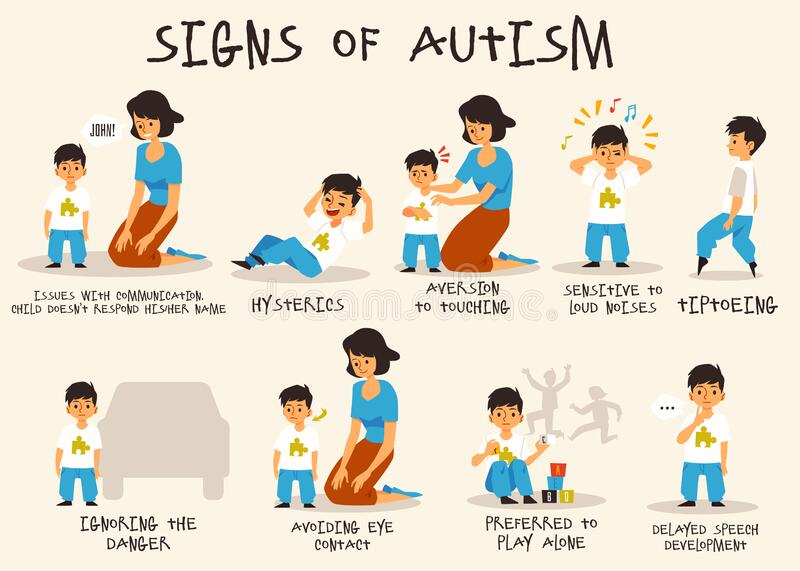Everyone desires a happy and healthy child, so it follows that all parents and guardians keep a lookout for health issues that might impair the normal growth and development of their little one.
Autism (ASD) as a neurological disorder usually manifests in the early years, around 18 – 24 months. Since there are no pathological screening tests in place, the only way to recognize them at home is through careful observation of the infant.
As per statistics available, ASD is steadily on the rise for a variety of reasons. Therefore, it becomes imperative that children of all backgrounds and sexes are diagnosed early to avail the benefits of prognosis and treatment by a specialist to enable them to lead fulfilling and productive lives.
You may ask – why is it important to get children screened and treated at the earliest? What happens if a child remains undetected?
The answer is simple. ASD is not an ailment that the child can grow out of on her own as she acquires natural immunity. It needs prognosis by a medical expert and subsequent management. There are disturbing real-time reports of individuals who have suffered needlessly as children until the time they were treated for the disorder. (https://undark.org/2019/11/28/early-detection-autism/)
Thanks to modern medical care, it is perfectly possible for an individual with ASD to lead a normal life as an adult, perform at a job, enjoy different roles as a family member, and live as productively as a non-ASD (typical) individual.
Reversely, left untreated, there is a high possibility of a spinoff into several other complications as an adolescent/young adult and later as an adult, that may make personal and professional life complex and challenging. For instance, they may find it difficult to develop and maintain friendships; interact and express themselves freely with peers, and understand what is expected of them in social circles, at school, and in the workplace.
There may also be co-occurring health and clinical conditions such as obsessive-compulsive disorder, depression or anxiety, conduct disorder, and attention-deficit or hyperactivity disorder.
The basic way is, to begin with, a list of common signals that equips every parent/ guardian/ childcare provider/ teacher/ school psychologist to form an overall idea based on the child’s development. Keep this with you as a checklist to watch out for in your child.
However, it is important to remember that not all symptoms may manifest. Conversely, the presence of symptoms does not always indicate a case of autism but may be indicative of allied disorders.
A medical referral is necessary in all cases.
Here are the signposts –- A delay in communication with others, including the use of speech and gestures.
- Does not respond to one’s own name.
- Gets upset with a change of routine, including minor changes.
- Gets irritated and upset by loud noise.
- Gets easily affected and vexed by bright lights.
- Avoids eye contact with parents, siblings, and persons in proximity.
- Avoids and/or gets irritated and upset with physical signs of affection.
- May avoid most forms of contact with others.
- Does not look for approval or validation from mother for achievements and rejects sharing of emotions.
- Shows little interest in people and objects in the immediate environment.
- Fixed manner of arranging playthings and toys.
The above will usually hamper her social, emotional, and cognitive growth and development.

Autism Screening Tools used by paediatricians and specialists are used for screening and evaluation of children
- Modified Checklist for Autism in Toddlers (M – CHAT – R) – is a test comprised of 20 questions designed for toddlers between 16 – 30 months.
- The Ages and Stages Questionnaire (ASQ) – is a broad screening test that assesses the challenges at specific phases of growth during the development of the child.
- Screening Tool for Autism in Children and Young Children (STAT) – This is an interactive tool that is used for screening activities like play, imitation and communication in a child. It comprises a set of a dozen assorted activities.
- Parents’ Evaluation of Developmental Status (PEDS) – they are gradually being adopted.
While the above are the screening tests followed by specialists in the US, they are being adopted globally gradually. M-CHAT-R is a common and popular screening test in most nations.
The American Academy of Paediatricians (AAP) and the National Center on Birth Defects and Developmental Disabilities (NCBDD) have earmarked different milestones for the detection of ASD. The former recommends a standard 18 and 24 months mark during the well-child checkups, while the latter indicates a 9 – 18 – 24 – 30 months regimen.
In India, too, considerable work related to ASD has happened in the past decade. Together with advances in medical science and the rapid research and publication of nearly 100 papers in the field, there is much hope for individuals and families coping with ASD. At the same time, there are legislative rules and regulations in place which all affected families should be aware of. The RPwD Act, 2016 has included ASD under its scope of persons with intellectual disabilities, granting and assuring all affected individuals equal rights as other citizens of the land.
It is essential to stress that the checkups are simply preliminary and basic methods of detection and in case of need, a referral to a specialist is mandatory who will conduct a full risk assessment and advise on the management thereon.
To conclude, keep a keen lookout for any kind of restricted, stereotyped or repetitive behaviour or movements in your child. Check for oddities in social skills. Flag it up to your paediatrician at the earliest so that an innocent child does not slip through the cracks due to ASD that may lead her to miss out on precious childhood and hinder normal growth beyond that.
References:
screening assessment
ncbddd autism screening
Gov site
DISCLAIMER:
While every effort has been made to obtain information from reliable and authentic sources, this is not a substitute for medical advice. You should seek the guidance of a doctor or a qualified medical professional in case of need.
